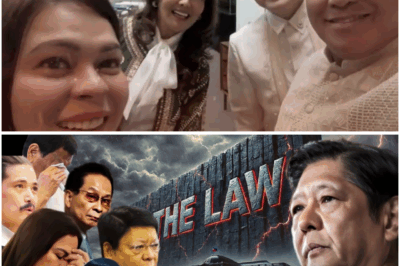
A tense and explosive session unfolded at the Philippine Senate today as the Blue Ribbon Committee exposed alleged irregularities involving government projects linked to an individual now dubbed the “Flood Control Queen,” Sarah Discaya. The revelation, broadcast live nationwide, sent shockwaves through political and public circles as senators laid out evidence suggesting large-scale corruption in flood control and infrastructure programs.
The committee, which has been investigating alleged misuse of funds under several regional public works offices, presented documents, testimonies, and financial trails that reportedly connect Sarah Discaya—a private contractor with powerful political ties—to multiple questionable projects amounting to hundreds of millions of pesos.
Senator Risa Hontiveros opened the session with a pointed statement: “This is no longer just about overpriced materials or delayed construction. This is about a system of greed that has turned public service into private profit.” The senator went on to describe how certain contractors, allegedly favored through political influence, cornered a majority of flood control projects despite repeated red flags from the Commission on Audit (COA).
According to preliminary findings, Discaya’s companies allegedly won multiple government contracts despite inconsistencies in documentation, overlapping project schedules, and identical bid amounts—indicators that, according to experts, suggest collusion or bid rigging. The committee also cited reports of substandard project implementation in several flood-prone provinces, where millions of pesos were allocated but very little progress could be seen on the ground.
Senator Alan Peter Cayetano questioned how one individual could secure so many high-value contracts in such a short time. “How does one private contractor manage to dominate flood control projects across regions? Either she’s the best engineer in the country—or there’s something deeper happening here,” he remarked.
During the hearing, whistleblowers presented sworn statements claiming that Discaya maintained close connections with several officials from the Department of Public Works and Highways (DPWH). One witness alleged that “facilitation fees” were regularly paid in exchange for project approvals and faster fund releases. Another testified that some of the supposed completed projects existed only on paper.
In response, Sarah Discaya—who appeared briefly via video conference—strongly denied all accusations, calling them “politically motivated lies.” She insisted that her company followed every legal procedure and that her success in winning bids was due to her firm’s efficiency and reliability. “I am being targeted because I am a woman succeeding in a male-dominated field,” she said. “All my records are open to public scrutiny.”
Her statement, however, did little to calm the senators. Senator Francis Tolentino demanded that the DPWH immediately release all documents related to Discaya’s contracts, while Senate President Juan Miguel Zubiri called for a full audit of all flood control projects funded over the past five years. “The Filipino people deserve to know where their money went,” Zubiri emphasized. “Billions were allocated for flood prevention, yet every year, our cities and provinces still drown.”
Public reaction was swift. Within minutes of the live broadcast, #FloodControlQueen and #BlueRibbon trended on social media, with netizens expressing outrage and disbelief. Many called for stronger accountability measures and harsher penalties for corruption in infrastructure projects. “We’ve been suffering floods for years,” one user posted. “Now we know why—our taxes were literally washed away.”
Transparency advocates praised the Senate’s boldness in bringing the issue to light. “This is exactly why live hearings are important,” said political analyst Tony La Viña. “When the public can see and hear the evidence themselves, it builds pressure for reform.”
The Blue Ribbon Committee is expected to continue its investigation in the coming weeks, summoning more witnesses and reviewing records from both local and national offices. Legal experts predict that if the evidence holds, several officials and contractors could face administrative and criminal charges.
As the scandal unfolds, the phrase “Flood Control Queen” has become a symbol of public frustration—representing not just one woman, but an entire system that many believe has long drained the country’s resources. For ordinary Filipinos, the hope is that this investigation marks the beginning of real accountability, not just another headline that fades when the cameras stop rolling.
News
Lumaganap na Umiinit na Isyu sa BGC: Viral na Pag-angkin ng Insidente Kay Sarah Lahbati, Nagdulot ng Matinding Reaksyon Online
Kumalat na naman ang isang maiinit na usapin sa social media matapos mag-viral ang isang post na nag-aangkin umano ng…
Eli SanFernando Kumasa: “Bakit Yung Iba May Kabet OK Lang, Pero Siya Hindi?”—Matapang na Pagtatanggol kay “Congress Meow”
Matagal nang umiikot ang mga usap-usapan tungkol sa isang kontrobersyal na isyu sa fictional na Kongreso—ang diumano’y pagkakadawit ni “Congress…
AKALA’Y SI PBBM ANG BINABANGGA, PERO HULI NA NANG MALAMANG MALI PALA ANG PADER NA SINUWAG
Sa politika, madalas nating makita ang mga pangyayaring punô ng tensyon, mga parinig na hindi pinapangalanan, at mga galawang hindi…
Ang Magagarang Buhay ng mga Anak ni Manny Pacquiao: Sino Nga Ba Sila sa Likod ng Yaman at Kasikatan?
Sa bawat tagumpay na nakikita natin kay Manny Pacquiao—sa ring, sa politika, at sa negosyo—madalas ay hindi natin napapansin ang…
Milyonaryo, Nagulat Nang Masilip ang Kwintas sa Leeg ng Dalaga: “Sa Anak Kong Babae ‘Yan!”
Sa mundo kung saan ang kayamanan ay madalas nagtatabing sa katotohanan, may mga pangyayari pa ring hindi nabibili ng pera—mga…
KILIG MOMENT: Pau, Nakitang Kumiss sa Noo ni Kim Chiu Pagkatapos Siyang Sunduin sa ASAP Studio
Nagkagulo ang social media matapos kumalat ang tsismis na may “kilig moment” umano sina Paulo at Kim Chiu sa loob…
End of content
No more pages to load












